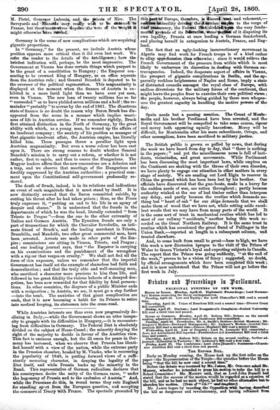Germany is the scene of new complications which are acquiring
gigantic proportions.
In " Germany," for the present, we include Austria whose position appears more critical than it did even last week. We refer the reader to the details of the intelligence ; here the briefest indication will, perhaps, be the most impressive. The Government at Vienna has done certain things which purport to be the grant of a constitution to Hungary ; the Emperor con- senting to be crowned King of Hungary, as an office separate from the Austrian rule ; and General Benedek is deputed to be the overseer of the political regeneration. This magnanimity is displayed at the moment when the finance of Austria is ex- hibited in a more lurid. light than we have ever yet seen, even in Vienna. The new loan of twenty millions has so far " succeeded " as to have yielded. seven millions and a half ; the re- mainder " probably " to accrue by the end of 1861. The disastrous state of finance is no doubt the reason why Baron Bruck has dis- appeared from the scene in a manner which implies weari- ness of life in Austrian service. If we remember rightly, Bruck first attained distinction in the North of Germany, by the great ability with which, as a young man, he wound up the affairs of an insolvent company ; the anxiety of his position as manager of that gigantic insolvent affair, the Austrian empire, has literally killed him. These passages throw a peculiar Tight upon Austrian magnanimity. But even a worse colour has been cast upon it. There are strong reasons to doubt whether General Benedek's mission is to carry out a reform, or whether it is not rather, first to cajole, and then to coerce the Hungarians. The Magyar leaders affirm that the new concessions are a delusion and a trap, and we observe that meetings of the Hungarians are forcibly suppressed by the Austrian authorities ; a practical com- ment upon the Constitutional self-government professedly re- stored.
The death of Bruck, indeed, is in its relations and indications an event of such magnitude that it must stand by itself. It is now distinctly avowed that the Baron committed suicide, by cutting his throat after he had taken poison ; thus, as the Times truly expresses it, "putting an end to his life in an agony of despair and shame." It is understood that the frauds in the departments of which he was the head, literally extended " from Trieste to Prague "—from the one to the other extremity of Italian and German Austria. The Eynatten frauds are only a part of transactions for which the Chevalier Revoltella, an inti- mate friend of Bruck's, and the leading merchant in Trieste, trambilla, and Mandell°, two other great commercial men, have been arrested. Arrests are made in other parts of the Em- pire ; commissions are sitting in Vienna, Trieste, and Prague ; and our leading journal says, that " the Emperor is carrying on his examinations and the punishment of the wrongdoer with a rigour that verges on cruelty." We shall not feel all the , force of this exposure, unless we remember that the imperial Government has itself set the example of shameless bad faith and demoralization ; and that the truly able and well-meaning man, , who sacrificed a character more precious to him than life, and followed in too great fidelity the vicious behests of a decayed des- ' potism, has been now rewarded for that fidelity by fatal persecu- tions. In other countries, the disgrace of a public Minister ends with a resignation ; in Austria, we see, it must go a step further —into the tomb. The anxieties of that giant complication are such, that it is now becoming a habit for its Princes to retire into medical keeping, its statesmen into the cross-road.


























 Previous page
Previous page